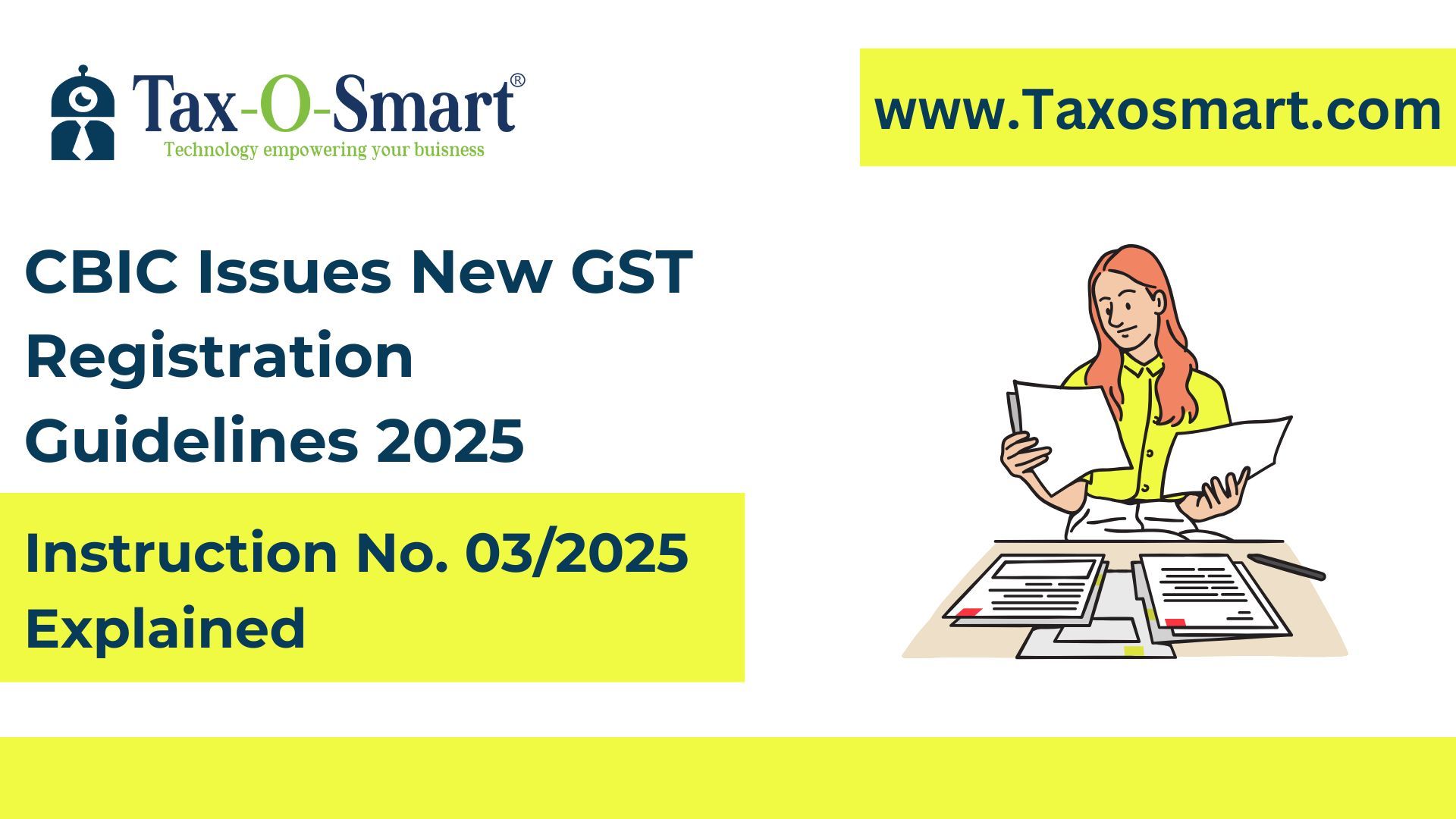
CBIC Issues New GST Registration Guidelines 2025 | Instruction No. 03/2025 Explained
16 Jun 2025
CBIC Issues New GST Registration Guidelines 2025 | Instruction No. 03/2025 Explained
The instruction reaffirms CBIC’s focus on balancing fraud prevention with taxpayer facilitation. It aims to curb procedural harassment of genuine applicants while tightening oversight of high-risk or suspicious registrations.
WHY THIS INSTRUCTION WAS NEEDED
Over the past year, the CBIC received numerous complaints that GST registration applicants especially new and small businesses—were being asked for irrelevant, excessive, or unjustified documents. In some cases, GST officers raised speculative queries or delayed application processing, frustrating legitimate taxpayers and undermining the ease of doing business.
While it's critical to prevent the misuse of Input Tax Credit (ITC) through bogus entities, this cannot come at the cost of procedural fairness. Instruction 03/2025-GST sets out clear boundaries and timelines for both applicants and officers.
DOCUMENT VERIFICATION GUIDELINES
The CBIC has clearly specified which documents are acceptable for GST registration, especially regarding proof of business premises. Officers are barred from requesting unrelated licenses like Udyam, MSME, or Shop and Establishment registrations.
| ENTITY TYPE | REQUIRED DOCUMENT(S) |
| Partnership Firms | Partnership Deed |
| Societies, Trusts, AOPs | Registration Certificate/ Proof of Constitution |
| SCENARIO | REQUIRED DOCUMENTATION | REMARKS |
| Owned Premises | Any one of the following:
| No physical originals required during processing |
| Rented Premises |
| PAN or photo of lessor is not required. (No additional documents required if agreement is not registered) |
| Unregistered Rent Agreement |
| Identity proof is required if agreement is unregistered |
| Premises of Relatives/ Spouses | Consent letter Owner’s identity proof Ownership document (any one standad document) | Useful for family-run businesses operating from shared addresses |
| Shared Premises |
| Similar documentation as that of relative/ spouse |
| No Rent Agreement |
| - |
| Special Economic Zones | SEZ-related Government approval documents | Submit along with other relevant documentation |
- Udyam Certificate
- MSME Registration
- Shop and Establishment Licenses
- Any non-essential licenses not required for GST registration
AVOIDING PRESUMPTIVE OR IRRELEVANT QUERIES
GST officers are explicitly discouraged from raising queries not directly linked to the documents provided, such as:
- Asking about prohibited goods under certain HSN codes in a state
- Questioning whether the declared business activity is “viable” at the registered location
- Raising doubts based on the location of signatories or assumptions about address feasibility
| Application category | Timeline for Processing |
| Aadhaar authenticated/ non-risky | Within 7 working days |
| Aadhaar not authenticated/risky | Within 30 days (after physical verification) |
For risky applications, physical verification must be conducted and uploaded using FORM GST REG-30 at least 5 days before the 30-day deadline.
CLARIFICATIONS VIA FORM GST REG-03
Officers may issue a clarification request (FORM GST REG-03) under the following conditions:
- Documents are illegible or incomplete
- Address mismatch or vague location details
- Linked PAN shows suspended/cancelled GSTINs
- Any request for additional documents beyond standard lists requires prior approval
CONSEQUENCES OF NON-COMPLIANCE OR DELAY
| Where the officer fails to issue the notice/act in time, the officer would be held accountable | CONSEQUENCE |
| Failure to respond to notice issued in Form GST REG-03 within 7 working days | Application rejected via Form GST REG-05 |
| Unsatisfactory response made in Form GST REG-04 | Officer may reject the application with written justification |
Where the officer fails to issue the notice/act in time, the officer would be held accountable
CBIC emphasizes that officers who miss deadlines or misuse discretion may face administrative action, including disciplinary measures.
ADMINISTRATIVE OVERSIGHT & IMPLEMENTATION
To ensure uniform application of these guidelines, all Principal Chief Commissioners/ Chief Commissioners are instructed to:
- Supervise registration procedures
- Monitor delays and non-compliance
- Discipline officers found violating these instructions
- Issue trade notices to clarify document requirements in their jurisdiction.
- Ensure adequate staffing to manage registration volumes effectively.
The issuance of CBIC Instruction No. 03/2025-GST marks a major shift toward a simplified, standardized, and taxpayer-friendly GST registration framework. By defining clear documentation norms, discouraging arbitrary queries, and enforcing time-bound application processing, the government is taking decisive steps to reduce procedural friction without compromising on fraud control.
At TaxoSmart, we understand that accuracy and compliance are key to avoiding delays and rejections. Whether you're applying for GST for the first time, managing multiple registrations, or supporting clients through regulatory transitions, our experts are here to ensure your applications are filed right the first time.
DISCLAIMER
The information contained in this document is prepared by R.J. Soni & Associates and TaxOSmart LLP (hereinafter referred to as RJSA) for information purpose only. It does not constitute any legal advice or tax advice. In no way, this document should be treated as a marketing material or efforts to solicit a client. While we have made every attempt to ensure that the information contained in this document is true, RJSA, its partners and/or any of its employees make no claims / guarantee about its accuracy, completeness, or up-to-date character, or warranty, express or implied, including the warranty of opinions expressed for a particular purpose, or assume any liability or responsibility for the accuracy, completeness, or usefulness of any information available from this document.